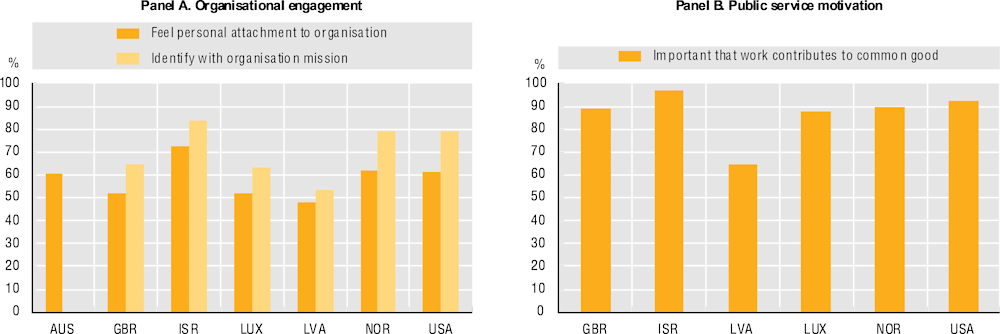Employees who are engaged with their work and organisation perform better and can be more proactive and innovative than those who are not. Organisations with more engaged employees also see less sick leave and higher retention rates. Common drivers of employee engagement include perceived quality of leadership and management, working conditions and opportunities for career progression (OECD, 2016). Employee engagement can thus be considered a performance measure for public organisations’ people management policies and practices.
Work engagement measures the relationship between employees and their specific job. In all seven countries that participated in a survey to civil servants, on average, 70% of respondents were satisfied with their job and considered that their work gives them a sense of accomplishment. Slightly fewer (an average of 63%) are inspired by their job (Figure 13.8). Israel had the highest rates of work engagement among these countries, consistent with the pattern in 2020.
Results show differences in the levels of engagement depending on levels of seniority, with common trends across the sample. For example, senior managers were more satisfied with their jobs than middle managers, with an average reported satisfaction of 4.4 compared to 4.0 out of 5. In turn, both these groups were more satisfied than senior and junior professionals, who both reported an average of 3.9. This trend was also present in relation to whether employees felt the work they did gave them a sense of accomplishment, with an average of 4.4 for senior civil servants, 4.1 for middle managers, and 4.0 and 3.9 for senior and junior professionals respectively (Figure 13.9). Differing levels of engagement by position are important to uncover with employee surveys, since they could point to differences in perceptions around important factors such as working conditions, career development opportunities, etc.
Organisational engagement measures the relationship between an employee and the organisation where they work (Figure 13.10, Panel A). The data here suggest that most public servants (an average of 71%) strongly identify with the mission of their organisations, but feel less attached to the organisation itself (an average of 58%). However, an average of 63% of public servants say they would recommend their organisation as a good place to work. A desire to contribute towards serving society, can often be one of the key elements that attracts people to work in the civil service. Public service motivation has the highest average score of all the questions in all the countries – this figure ranged from 64% in Latvia to 97% in Israel (Figure 13.10, Panel B).



